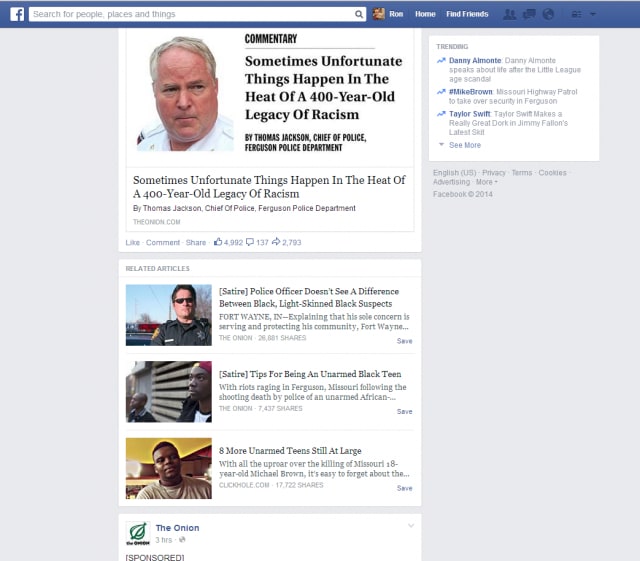Facebook Thinks You're Too Gullible For Satire
Is the social media giant overstepping its bounds?
 Credit:
Credit:
Products are chosen independently by our editors. Purchases made through our links may earn us a commission.
There are plenty of ways to embarrass yourself on Facebook, but falling for a satirical news headline may take the cake. Nevertheless, it happens every day. There’s even an entire website devoted to web users’ credulous reactions to articles from the notorious fake news site The Onion.
Well, apparently some social media users have been complaining to Facebook about it. Ars Technica reports that Facebook is currently experimenting with a “satire” tag to preface fake news articles and headlines from sites like The Onion, ClickHole, and The Daily Currant.
Specifically, Facebook will generate a list of related articles with a telltale “[Satire]” tag after you’ve clicked on a link to at least one satirical source. In other words, if you're taken to The Onion and feel tricked, you won't get fooled again. (Assuming you know what the word "satire" means, anyway.)
“We are running a small test which shows the text ‘[Satire]’ in front of links to satirical articles in the related articles unit in News Feed,” a Facebook representative explained to Ars. “This is because we received feedback that people wanted a clearer way to distinguish satirical articles from others in these units.”
The real question here is what sort of precedent Facebook is setting. Should Facebook exert editorial influence over another site's content? A simple “satire” tag doesn’t seem like a great affront to objectivity, but it does open up a path for the site to reshape external links in other ways.
There’s a reason a site like Literally Unbelievable is so popular: Satire exists to point out the absurdity of reality. The fact that it's sometimes interpreted as real points to a problem in the internet age—that an overabundance of information has conditioned us to believe just about anything, so long as it comes with an official-looking headline.
Via: Ars Technica Hero image: Ars Technica
